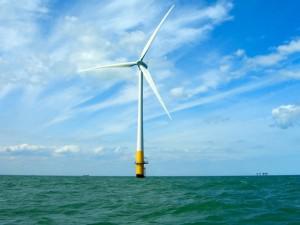 When you think of offshore wind, what comes to mind? Cape Cod, Massachusetts? Great Britain? How about a different “Great”? The Great Lakes to be exact. Governors of Illinois, Michigan, Minnesota, New York and Pennsylvania recently signed a Memorandum of Understanding (MOU) aimed at jump starting offshore wind development in the Great Lakes.
When you think of offshore wind, what comes to mind? Cape Cod, Massachusetts? Great Britain? How about a different “Great”? The Great Lakes to be exact. Governors of Illinois, Michigan, Minnesota, New York and Pennsylvania recently signed a Memorandum of Understanding (MOU) aimed at jump starting offshore wind development in the Great Lakes.
The Department of Energy announced that the “Great Lakes’ offshore wind energy resources could yield tremendous economic and environmental benefits throughout the region, and have the potential to produce more than 700 gigawatts of energy from offshore wind, about one fifth of the total offshore wind potential in the U.S.” As a point of reference, the National Renewable Energy Lab (NREL) figures each gigawatt produces enough energy to power some 300,000 homes.
Illinois Governor Pat Quinn espoused the position that “‘investing in clean energy projects and the development of wind resources helps promote economic development and create jobs, while reducing our dependence on foreign energy sources.’” Meanwhile, Minnesota Governor Mark Dayton, whose state ranks fifth in installed wind capacity, sees the move as a further sign of his state’s leadership in the arena of wind energy.
In addition to the aforementioned states, several other groups have signed the MOU. The list can be found below:
White House Council on Environmental Quality
U.S. Department of Energy
U.S. Department of Defense
U.S. Department of the Army
Advisory Council on Historic Preservation
U.S. Coast Guard
U.S. Environmental Protection Agency
U.S. Fish and Wildlife Service
Federal Aviation Administration
National Oceanic and Atmospheric Administration
Given the history of offshore wind, any project must undergo evaluation with regards to social, environmental, safety, and security issues.
[Image source]

